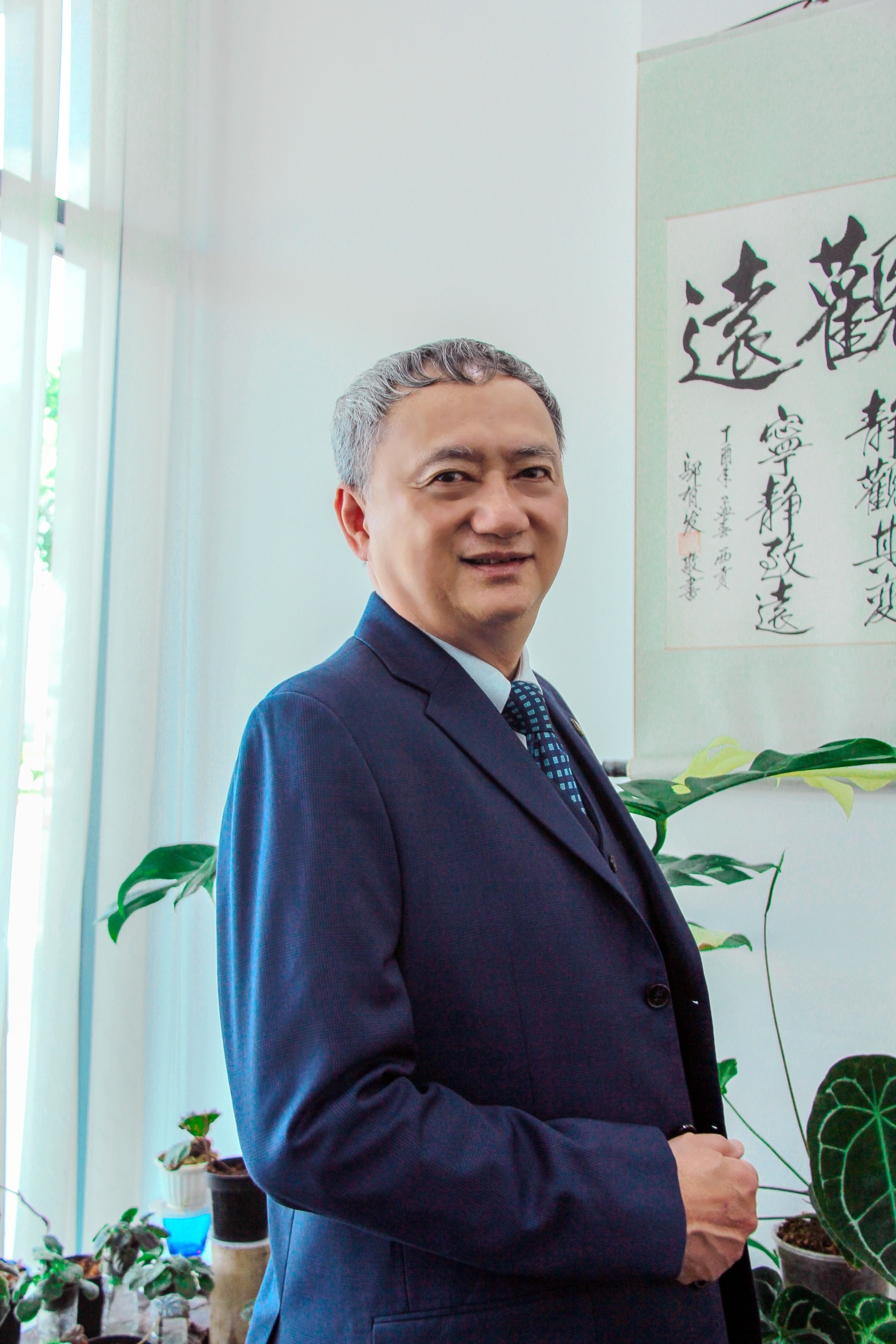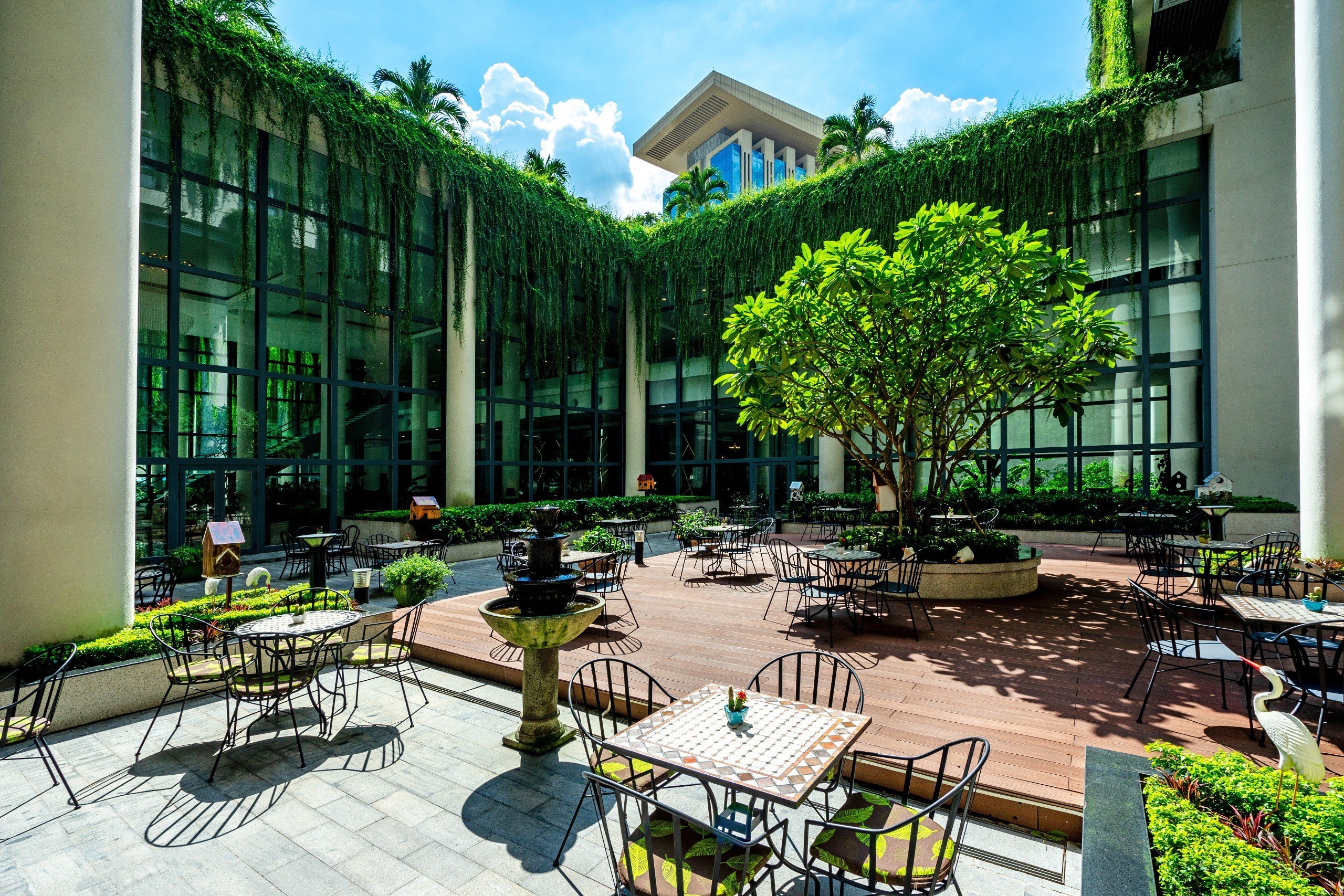Vietnam turns semiconductor vision into action
The global semiconductor industry is being reshaped by geopolitical tensions, shifting supply chains, and the surge of digital technologies.




Dr. Cheah Kuan Yean, General director of Becamex Hospitality, lecturer and coordinator of Hospitality Concentration in Eastern International University, Binh Duong, shares with TheLEADER his view on sustainable practices and what the hotels have done to achieve the mission on environment, social and governance (ESG).
Developing hotels in Binh Duong province, one of Vietnam's industrial hubs, how will it differ from locations that are traditionally famous tourist destinations? What opportunities and challenges arise in hotel development in this area?
Dr. Cheah Kuan Yean: Yes, it's very different when you are in the industrial town. But the fact is that when we structure hotel property, we look at the guest’s needs and wants.
In Binh Duong, we have a huge business community and they, as anybody in Ho Chi Minh City, Danang, Vung Tau or Phu Quoc, need accommodations with high comfort level and leisure. Then, we think about how people wanted to feel when they come back from work; how they feel when they are in their house or at home.
So first of all, that's how I started the mission statement, especially for Becamex Hospitality, to come up with our slogan as “Stay with us, feel like home”.
Basically, we want to address and entertain the needs they want as the businessman. We know that being the hospitality entity, we are here to do the attitude part, comfort and leisure, which giving us the reason to have the hotel built with a suburban architect design.

Luckily, the hotel is quite big in terms of coverage, has a nice tropical swimming pool, sport centre and wellness facilities. These added the resort feel for the guests to contradict their business environments when they are at their offices and work environments. Having said that, we do think a lot about our guest wellness.
Hopefully, this would create the cordial atmosphere of coming back to your nice villa, your garden by your side taking away the burdens of the working stress, leading you into a nice homely climate.
In fact, it is also different from other destinations and that's a challenge of what we need to do. As there are many different nationals staying with us accounting for about 90 per cent, we have to incorporate apposite cultural environments to make sure that our guest are satisfied.
We need to think of “neutral zone items” and cultural norm items. For example, in breakfast item selection, we provide porridge, natto beans, sushi, noodles, pancakes, and others.
By the items, I believed that you can guess which item is for which national. Not only that, even the swimming pool opening and closing time needs to be addressed to cater for all national as some of them preferred certain time period. We are international issue prone.
In your opinion, what will be the new trends in Vietnam tourism in next three – five years?
Dr. Cheah Kuan Yean: First, look at it in segments, people are looking more for full accommodation, full service. In other words, they want more like a comeback to my humble home with a bunch of servants waiting for me.
That's why we see that there's so many resident apartments or buildings, hotels centre have a joint mixed product of residents.
Also, people now move around the world and we can find all classes in one place so you need to meet different echelons of needs.
One other things is the Z generation of fast, convenient and available knowledge, which make hospitality industry vulnerable at any moment with a one touch on media devices. So as I taught my students that you don't have to tell the guests how beautiful, how nice your hotel is any more. They already know through website, social media and fanpage. So now, it's no longer product selling, it is human selling whereby you sell and market relationship.
In current business world, because of the knowledge transfer availability thanking to technology, industrial 4.0 and things like that, sales itself is no longer a hard product selling, it is about hard product relating and believing.
Do you think that the bad economic conditions in short-term will affect the mentioned trends?
Dr. Cheah Kuan Yean: We had an Covid-19 and then, there's a recession and now we're recovering. Now put it this way. In any period of recession, there are down and up.
For us as hospitality players, especially when we have diverse markets, customer bases, we have good customer foundation in general. Regardless whether it's recession or not recession, people will still need to eat, need to sleep, and need to travel to deal with their concerns.
When it comes to the big picture of FDI, GDP or bank interest market, I hear a lot of bad things, but in the end may come down to the fundamentals of economic business. For instance, even though you're going bankrupt, the managers will still need to stay to work for a few months or years to get it done. So the economy for us is still there. Sounded crude but there is a need for someone to provide basic needs of hospitality service-products in one way or another.
But then, we have to be really be smart with our customization or products. The easiest one is price. So it's still an opportunity to have a piece of the pie if you do it right, and fortunately, we did.
Millions of dollars might have to go down, but people have to bread and board to stay and work. That's our comfort zone.

Can you share some practices toward ESG in Becamex Hospitality?
Dr. Cheah Kuan Yean: We believe in the three factors E, S and G are that have always in our corporate governance.
In terms of what we have done in the hotel already, one of restaurant which can sit about 350 guests is totally powered by solar energy which actually accounted for 15 per cent of our total electricity usage.
All amenities in the hotel are turned into sustainable materials, for example, from toothbrush comb to shampoo container so and even our slippers are bio recyclable. The word “plastic ” no longer exist in our room amenities.
We also changed all lights in hotel to led lights which save electricity cost tremendously.
In my three-star hotel that was built ten year ago, we are changing all air conditioners to the inverter model for less energy consumption and at the same time, saving electricity cost.
The implementation cost of the above will be high at the beginning, but the positive attributes created and delivered are commendable. For instance, the room amenities I talked about will cost about 8 – 15 per cent more in room costing but it is all worthwhile for sustainability practices.
Related to Corporate Social Responsibility, CSR, many people say CSR is for corporate, for employees, and for community but in hospitality, CSR also means being responsible of our guest wellness.
In terms of guest wellness is an important concern for us. We try to incorporate as many wellness activities and facilities as possible for our guests. We encourage them to exercise with our bicycle around the park; enjoy our free yoga classes; and transportation to HCMC during the weekends. We have also extended our breakfast spread in our 4-star hotel with the Vietnamese herbal tea selections in a dedicated corner.
The tea selections and together with the information and samples displayed would hopefully guide the guest to enjoy their breakfast with the healthy herbal tea to start off the day.
In Becamex, we define ESG is a continuous industrial for hospitality. Social is just not citizen or guest community, it also means our guests wellness and about employee wellness.
How do you think about the opinion that ESG criteria are applied only for high-end hotels like four, five-star ones?
Dr. Cheah Kuan Yean: For four or five star hotels, they need to reach the standards by exploring ESG as a good triple-bottom-line model or smart hotel. It is definitely, an important branding element in current business context.
In Becamex, we define ESG is a continuous industrial for hospitality. As I said before, social is just not citizen or guest community, it also means our guests wellness and about employee wellness.
ESG has been done one way or another, for example, you give a charity is already social in ESG. Everybody has been doing it but the point is that we have to make the board of director or the top management to be seriously involved and to realize that they have to practice more in ESG whenever it is feasible and viable.
Right. So, your question was it last, it has been there for hour it will last what a government encouraged you to government definitely were encouraged, I work very closely with my department sport and culture and tourism union.
Sustainable development has been there forever whether encourage or not. In fact, the government definitely encourage it when I worked very closely with the Department of culture, sports and tourism in Binh Duong.
So, ESG has always been there and definitely is not only for four or five-star hotel. Each property has their own definition of ESG and from there, they can do whatever fishable and affordable according to corporate structure.
In three factors E, S and G, which should come first in company’s mind?
Dr. Cheah Kuan Yean: To answer that, I think the company shouldn't focus on the significant level of any of this, they should focusing on put their focus on their organization and culture.
The ESG actually comes from practice and the attributes of the organization culture. For instance, especially in hospitality, I tell my staff, whenever you start to work in my hotel, you're not Vietnamese, you are the hotel citizen. You don't behave like Vietnamese, you need to behave what the hotel culture norms or cultural hotel behavior. The staff need to be professionally.
And that professionalism come from the organization's culture. Related to ESG, it is how much a company believe in doing goodness. ESG is about being kind and goodness to the world.
One thing I want to stress is that the governance is a culture. So that's why one company’s culture must have a CSR culture – corporate social responsibility and that’s how E and S come in.
To answer your question, the G come first because of organizational culture. If the governance is not right, you can do E or S just one or second times and then stop.
Thank you very much.
The global semiconductor industry is being reshaped by geopolitical tensions, shifting supply chains, and the surge of digital technologies.
The change in APA approval authority is expected to shorten processing time and enhance business proactiveness in international tax negotiations.
As hybrid cloud systems grow more complex, Vietnamese enterprises are struggling to detect cybersecurity threats moving laterally within their own networks.
The submission of the draft resolution on Vietnam’s international financial center to the National Assembly heralds a new developmental era for the country.
More than just running a 5-star resort, Kristian Petersen is redefining the art of hospitality with a humane and sustainable leadership philosophy.
For Tyna Huynh, co-founder of Drinkizz, organic is not just a food choice but a way of life that fosters a deep connection between people, nature and community.